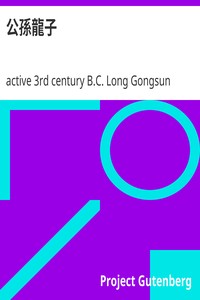公孫龍子 by active 3rd century B.C. Long Gongsun
Read now or download (free!)
| Choose how to read this book | Url | Size | ||||
|---|---|---|---|---|---|---|
| Read online (web) | https://www.gutenberg.org/ebooks/7216.html.images | 41 kB | ||||
| EPUB3 (E-readers incl. Send-to-Kindle) | https://www.gutenberg.org/ebooks/7216.epub3.images | 96 kB | ||||
| EPUB (older E-readers) | https://www.gutenberg.org/ebooks/7216.epub.images | 95 kB | ||||
| EPUB (no images, older E-readers) | https://www.gutenberg.org/ebooks/7216.epub.noimages | 70 kB | ||||
| Kindle | https://www.gutenberg.org/ebooks/7216.kf8.images | 172 kB | ||||
| older Kindles | https://www.gutenberg.org/ebooks/7216.kindle.images | 167 kB | ||||
| Plain Text UTF-8 | https://www.gutenberg.org/ebooks/7216.txt.utf-8 | 32 kB | ||||
| Download HTML (zip) | https://www.gutenberg.org/cache/epub/7216/pg7216-h.zip | 95 kB | ||||
| There may be more files related to this item. | ||||||
Similar Books
About this eBook
| Author | Gongsun, Long, active 3rd century B.C. |
|---|---|
| Title | 公孫龍子 |
| Alternate Title | Gongsun Longzi |
| Credits | Produced by Wan Ting Gong |
| Summary | "公孫龍子" by active 3rd century B.C. Long Gongsun is a philosophical text thought to be composed during the early period of Chinese philosophical thought, roughly during the Warring States period. This work is primarily focused on linguistic philosophy and metaphysics, exploring complex arguments regarding concepts of being, naming, and logic, epitomized in the famous 'White Horse' paradox. The book serves as a fascinating exploration of how language shapes our understanding of reality. The core of "公孫龍子" revolves around a series of dialectical arguments, with the central theme being an analysis of language, classification, and identity. One of the key discussions is the claim that a "white horse is not a horse," which challenges the reader's perceptions of categorization and definitions. The text delves into the distinctions between actual entities and their descriptions, illustrating how language can both clarify and obscure meaning. Through a series of dialogues and logical puzzles, the author encourages the audience to reconsider the nature of existence and the limitations of their own understanding, ultimately illuminating the profound connections between language, thought, and reality. (This is an automatically generated summary.) |
| Language | Chinese |
| LoC Class | B: Philosophy, Psychology, Religion |
| Subject | School of logicians (Chinese philosophy) |
| Category | Text |
| EBook-No. | 7216 |
| Release Date | Jan 1, 2005 |
| Most Recently Updated | Dec 30, 2020 |
| Copyright Status | Public domain in the USA. |
| Downloads | 108 downloads in the last 30 days. |
| Project Gutenberg eBooks are always free! | |

